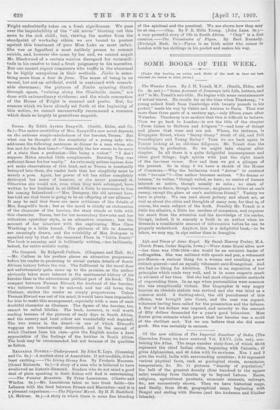Teresa. By Edith Ayrton Zangwill. (Smith, Elder, and Co. 6s.)—The
entire credibility of Mrs. Zangwilrs new novel depends on the extreme simple-mindedness of the heroine, Teresa. But what can be thought of the simplicity of a young lady who addresses the following sentences at dinner to a man whom she has met for the first time ?—" Generally the law seems to be more of a state than a profession—like being a widow." "I don't suppose Helen exacted little compliments. Burning Troy was sufficient flame for her vanity." An extremely artless ingenue does not make observations of this kind, and as Teresa is constantly betrayed into them, the reader feels that her simplicity must be merely a pose. Again, her power of wit has either completely destroyed her sense of humour, or she never possessed it. Otherwise she would not, even when they were estranged, have written to her husband in so stilted a form to announce to him his coming fatherhood:—" Mrs. Dempsey, the old servant here, has told me that there is going to be an offspring of our alliance." It may be said that these are mere criticisms of the details of Mrs. Zangwill's book ; but as the novel is chiefly an elaboration of the character of the heroine, the story stands or falls with this character. Teresa, but for her momentary fireworks and her ridiculous epistolary style, is an attractive creature ; but the account of her interview with the captivating Miss Clare Worthing is a little forced. The pictures of life in America are amusingly drawn, and the volubility of Mrs. Dekeyser is equalled only by that of the immortal. Flora in "Little Dorrit." The book is amusing and is brilliantly written,—too brilliantly, Indeed, for entire artistic verity.






































 Previous page
Previous page